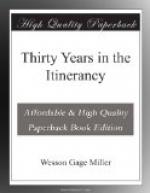On this charge also the writer took his first serious lesson in Church trials. The matter in question arose out of a misunderstanding between a man and his wife, growing out of a want of interest, perhaps, on the part of the one, and jealousy on the part of the other. Like other inexperienced administrators whom I have known, in trying to make crooked things straight, I invoked an agency that became a fire and a sword in my hand. Neither the Church nor the individuals concerned derived any advantage in the result, and though the wisdom of the administration was never called in question as far as I knew, yet I could not suppress the conviction that Church trials can only be commended as a last resort. It is much easier to awaken than allay the spirit of strife. Abating this discordant note, which did not long disturb the harmony of the Church, the two years we spent on this charge are freighted with most precious memories. Full of incident, and fragrant with blessing, they form a bright link in the chain of our itinerant life. Happy in our work, with only occasional calls for special services abroad, the years passed swiftly and joyously.
Referring to services abroad reminds me of the Quarterly Meeting I held for the Presiding Elder, on what was then called Howard’s Prairie, some twenty miles distant. Seated in my buggy with my wife and child, I started on Friday afternoon for the place. We reached the neighborhood at nightfall. We were directed by the Elder to call on a given family for entertainment, the gentleman being the most wealthy Methodist in the settlement. We halted the buggy at his gate, and I went in to crave his hospitality. As I approached the door and addressed myself to the master of the premises, he put on a frigid expression of countenance, and answered me coldly. I decided at once that I would not make myself known, but try the spirit of the man. I inquired whether there was to be a Quarterly Meeting in his neighborhood. He replied in the affirmative. I then inquired where the Methodist preachers put up when they came into the settlement.
He said, “They usually put up at the second house further on.” I concluded the old gentleman was not expecting company until the Presiding Elder should come, and so concluded we had better go on. As I retired the old gentleman looked sharply after me, but doubtless thinking so small and young a man as I then was could not be the Elder, he permitted me to go on my way. We went on to the house indicated, and inquired of the gentleman at the gate whether the Methodist preachers who visited the settlement usually found entertainment with him. He replied, “I am not a Methodist myself, but my old woman is one, I believe, and she sometimes takes in the preachers on her own hook, but she is not at home to-night. Why didn’t you stop up at the white house on the hill? He is the loudest Methodist in this neighborhood.” I inquired, “Who lives up here in this small house that we have just passed?”




